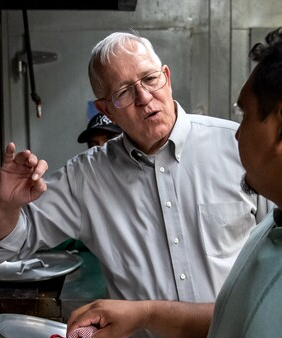The southern border of the United States has long functioned as a political symbol of national security, territorial integrity, and rule of law. People who are migrating across the southern border are often painted as criminals, invaders, or in other dehumanizing terms. Yet Pope Francis reminded the world in his September 19 message on the World Day of Migrants and Refugees that “God not only walks with his people, but also within them, in the sense that he identifies himself with men and women on their journey through history, particularly with the least, the poor and the marginalized.”
Organizations and workers providing relief to these migrants have been targeted legally, politically, and physically in recent years as debates around migration and border enforcement have become increasingly volatile. Given the salience of border security issues in U.S. political debates, especially ahead of the 2024 presidential election, this gathering for Georgetown students examined the effects of media narratives and political rhetoric around U.S. southern border migration. Featuring Ruben Garcia, executive director of Annunciation House in El Paso, Texas, it explored how those narratives affect the experiences of people who are migrating and the work of those seeking to ensure that their migration is dignified and humane.
Christian Soenen, projects manager of the Initiative, and Zeena Alfayez, president of the Migration and Refugee Policy Initiative, co-moderated the conversation.
This in-person gathering was only open to Georgetown students, faculty, and staff and was co-sponsored by the Migration and Refugee Policy Initiative, a student organization at Georgetown University’s McCourt School of Public Policy.


